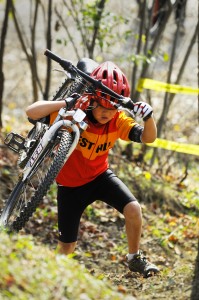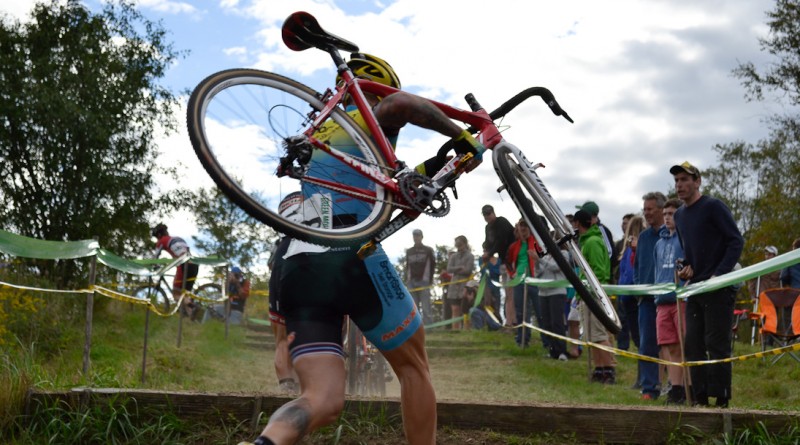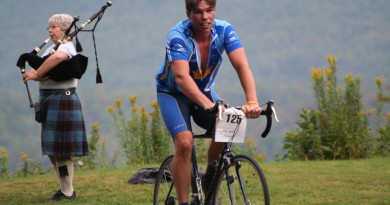Mud, Sweat, and Gears | Vermonters Are Falling for Cyclocross
 Many look at cyclocross competitions and wonder, “what’s the point?” After all, the goal of most bicyclists is to stay on the bicycle, not carry it on their shoulders. Instead, the sport of cyclocross involves varied terrain and obstacles that require dismounting. To the uninitiated, it may look a bit odd, but to aficionados, it’s a wonderful challenge.
Many look at cyclocross competitions and wonder, “what’s the point?” After all, the goal of most bicyclists is to stay on the bicycle, not carry it on their shoulders. Instead, the sport of cyclocross involves varied terrain and obstacles that require dismounting. To the uninitiated, it may look a bit odd, but to aficionados, it’s a wonderful challenge.
Cyclocross bikes are closer to road bikes than mountain bikes, with lightweight construction, narrow tires, and drop handlebars. The difference comes from stronger frames, lower gearing, cantilever brakes, and greater tire clearance for riding in mud. Despite the drop handlebars, riders have a more upright position.
Joshua Saxe of Burlington built his first bike in high school from recycled parts, but he has refined his technique as the founder of Flahute Bikes. The company makes a variety of frames, including two cyclocross bikes. Saxe said many of his customers aren’t racers but cyclists who want a versatile bike for commuting and/or riding on dirt roads. That said, he thinks cyclocross is growing throughout New England. “It’s for people who want to get dirty and do something that looks and sounds insane,” he said.
Vermont doesn’t host many cyclocross races, but there are a few regular events including the Paradise Cross Frenzy in Windsor, the West Hill Shop Cyclocross Race in Putney, and the Green Mountain Cyclocross Weekend at Catamount Family Center in Williston.
The Paradise Cross Frenzy is moving to a new location. “It’s going to be urban style,” said Paradise Sports owner, Rich Thomas. “We’re trying to mix things up a bit.” This will be the fifth year for the event, which will take place on Nov. 9. During the early years, the race attracted roughly 80 riders, but last year saw close to 200 cyclists for the event, which is sanctioned by USA Cycling. Thomas said cyclocross is good for kids because it keeps them away from dangerous roads and good for masters-level cyclists because the events are shorter. “They’re high intensity,” he said, “but they require fewer hours of training while still being competitive.” Thomas lauded cyclocross as a great spectator sport. He also thinks the funkier aspects of it — races are often sponsored by breweries — has given it a bit of cult status.
Jim Sweitzer of the West Hill Shop in Putney says cyclocross has been part of the “West Hill culture” since 1984. Starting in late August and continuing through mid-November, the shop offers Wednesday practice sessions on their racecourse. This year, the race will take place on Nov. 10, marking its 23rd year. Thanks to the race’s longevity, members of the Putney Bike Club have excelled in local and national events supplying several age-group champions in 2001 and a men’s masters winner in 2008.
Sweitzer said the sport has grown significantly over the last decade; now, on any given fall weekend, there are two or three races in the New England area. Attendance records don’t exist from the early days of the race, but in 2008, there were 139 racers, and four years later, the number was 228. Sweitzer described the West Hill course as “old school” and noted that aside from the removal of a few barriers, it has not changed appreciably in 23 years. The course is notorious for its run-up, which is roughly 45 feet, has a slope of at least 30 degrees, and is often quite slippery. Since the race is the day after the Paradise Sports race, the two events are billed as the Vermont Cross Weekend.
Catamount Outdoor Family Center began running a Wednesday night cyclocross race in 1999 and the following year added a weekend race. Executive director Eric Bowker said initially they were lucky to get 30 to 35 riders, but in the last few years, attendance has increased greatly. In 2011, the largest race had 77 cyclists, but in 2012, the average attendance was 80, and two races had more than 100 participants each. Bowker said this mirrors the growth of cyclocross nationwide; it is the largest participant sport of the three bicycle disciplines.
Bowker starts the Wednesday-night series with a free clinic. He would continue the six-week series even longer but for the lack of daylight. As it is, the series ends with a cookout in the dark after the last race. When the series began, most riders simply used their mountain bikes, but now virtually all have cyclocross-specific bicycles. Riders range from teenagers to those in their 60s with regulars from Canada, New Hampshire, and the Killington Mountain School. The weekend race, which is known as the Green Mountain Cyclocross Weekend, will take place on Sept. 14 and 15. It’s sanctioned by the Union Cycliste Internationale and attracts racers from across the country and Europe. The weekend is considered the first race of the Verge New England Cyclocross Championship Series, which includes races in Maine and Massachusetts. Last year, Jericho-born Jamey Driscoll finished second among elite men.
It may not be for everyone, but cyclocross is definitely a growing sport. Although it may seem counterintuitive, throw a bike over your shoulder and give it a try.


